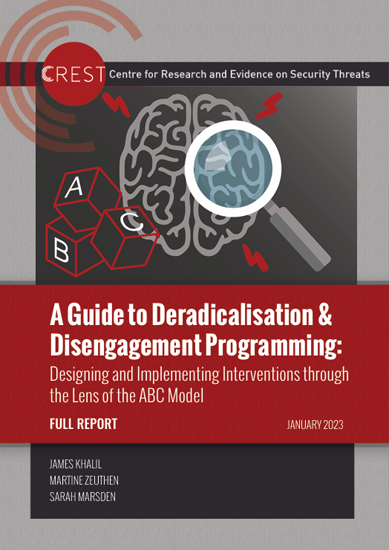This report focuses on interventions designed to promote and facilitate exits from ideologically justified violence – often referred to as ‘tertiary’ interventions. The beneficiaries of these programmes include individuals convicted of terrorism charges, as well as those who voluntarily disengaged. Relying on the authors’ Attitudes Behaviours Corrective (ABC) Model of Violent Extremism (Khalil et al., 2022), and drawing from their extensive professional experiences of providing technical support to such interventions, this report presents a novel framework to help practitioners develop and implement these programmes. 4 Ex A Guide to Deradicalisation & Disengagement Programming EXECUTIVE SUMMARY to question beliefs that legitimise and justify violence y Outcome 4 - Needs: Enhanced ability to achieve personal needs through nonviolent means y Outcome 5 - Wellbeing: Improved psychological wellbeing There is considerable disagreement among thematic experts as to whether these interventions should treat disengagement or deradicalisation as their overarching objective. While the former refers to voluntary exits from violence, the latter is widely (although not universally) interpreted in relation to attitudinal change. We incorporate both of these concepts into our framework of change (our ‘results chain’ using Monitoring and Evaluation (M&E) language), treating disengagement as the uppermost objective (our desired ‘impact’), and deradicalisation as a subordinate aim (an ‘intermediate impact’). Viewed in this manner, attitudinal change provides only one of several avenues through which disengagement may be achieved. Below these uppermost objectives, our framework also incorporates the following mid-level aims (‘outcomes’):
Outcome 1 - Networks: Reduced ties to malign influencers and enhanced ties to prosocial alternatives
Outcome 2 - Identity: Diminished salience of social identities associated with violence
Outcome 3 - Ideology: Enhanced willingness to question beliefs that legitimise and justify violence
Outcome 4 - Needs: Enhanced ability to achieve personal needs through nonviolent means
Outcome 5 - Wellbeing: Improved psychological wellbeing
As shall become apparent, many different initiatives (‘activities’) can contribute to these desired outcomes, including basic education, vocational training, religious guidance, family support, psychological support, and so on. We make no a priori assumptions about which of these are most likely to help achieve any particular outcome, with this varying substantially between contexts and clients. Indeed, it is for this reason we argue that these programmes should reflect local contexts, and be tailored to the needs of each beneficiary


